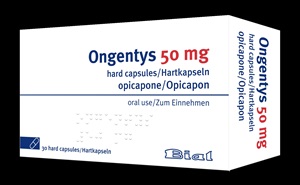SK Chemicals said Thursday it has won local marketing license for Ongentys (ingredient: opicapone), a Parkinson’s disease treatment developed by Portuguese drugmaker Bial.

The two companies signed an agreement in February 2018 to supply Ongentys exclusively in the Korean market. The first Parkinson’s disease treatment in the local market is to be released in the second half of 2020.
Ongentys is used for patients with Parkinson's syndrome who have motor fluctuations caused by the administration of levodopa/dopa decarboxylase inhibitor. The treatment prevents levodopa from breaking down in the bloodstream and prolongs its effect to improve symptoms.
In general, patients with Parkinson's disease who lack dopamine, a neurological substance in the brain, are given levodopa as a supplement. However, long-term use of levodopa leads to a shorter-acting duration, which may cause symptoms of motor fluctuations such as slower body motion before the next dose.
Bial, the developer of Ongentys, conducted phase-3 clinical trials in 30 countries around the world, including Europe and Korea. The results showed that the drug was superior to the placebo to reduce off-time (the time when the patient finds it impossible or difficult to move), as the drug inhibited the degradation of levodopa and thus increased levodopa delivered to the brain.
Ongentys first obtained approval from the European Medicines Agency in June 2016 and arrived in Germany, the U.K. and Spain in 2017, and Portugal and Italy in 2018.
According to data from IQVIA MIDAS, Ongentys took up 38 percent and 51 percent market share among the same mechanism-based drugs market in Portugal and Italy, respectively. In Spain and Germany, it has a 43 percent and 26 percent market share, respectively.
This year, Bial is seeking a marketing license in the U.S. and Japan through local partners and expects to win the nod in the first half of next year.
“The supply of the new drug to improve motor fluctuations of people with Parkinson’s disease will broaden the scope of treatment options for patients,” said Kim Jeong-hoon, head of the R&D Center at SK Chemicals. “We will enhance the portfolio of the central nervous system drugs to secure the public’s health rights.”
The Health Insurance Review and Assessment Service (HIRA) data shows about 110,000 Koreans suffered from Parkinson’s disease last year. The anti-Parkinson’s treatment market is worth 76.7 billion won ($64.9 million), according to IQVIA.

